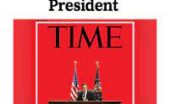Molly Minturn - My family is heartbroken to share that my father died in surgery on Monday, Feb. 10. It…
U.S. Presidential Campaign: David Jones’ view
Written by Diana Thebaud Nicholson // August 1, 2007 // David/Terry Jones, Politics, U.S. // Comments Off on U.S. Presidential Campaign: David Jones’ view
The following appeared in the 1 August edition of Embassy
Will the Next Presidential Candidates Please Stand Up
By David Jones
WASHINGTON, D.C. — The 2008 U.S. presidential election is the Democrats’ to lose. Not that parties haven’t managed to snatch defeat from the jaws of victory in the past, but a variety of historical, political, and cultural circumstances play heavily against the Republican Party.
The Republicans are at the end of a two-term presidential victory cycle. As U.S. presidents are constitutionally limited to two elected terms (eight years) in office, a third term is precluded, and voters almost invariably turn to the other party. Indeed, since the implementation of the 22nd Amendment with presidential term limits, only George H.B. Bush continued a party victory streak into a third term. Bush, in effect, got Ronald Reagan’s third term, reflecting the Gipper’s immense and enduring personal popularity.
Moreover, weighing against the Republicans is an economy that, while good, is not generally perceived as such by the citizenry. There is an unease that persists from the 2006 election when political corruption, although shared by both parties, landed most heavily on Republicans. The failure to resolve immigration concerns is also regarded as a Republican failure.
The economy, political corruption and immigration concerns weigh against the Republicans, and then there is Iraq. No Republican (and certainly not President Bush) can slide away from its consequences. Bush bet his presidential legacy on the presence of weapons of mass destruction in Iraq–and lost. By electing Democratic majorities in the House of Representatives and the Senate in November 2006, the American population voted to accept defeat in Iraq, whatever the consequences might be. It is not that there was no Democratic culpability in the war, but rather after four years of fighting, the possible gains are outweighed by the obvious liabilities. And since the Republicans got us into the war, the Republicans bear the onus for its failure. Losing wars is not a popular credential in U.S. politics; the Democratic defeats in 1952 during the Korean War and again in 1968 connected to Vietnam can be largely attributed to electoral dissatisfaction with war management.
Nevertheless, the population–not historical trends–votes for candidates. The presidential race is remarkably wide open; for the first time since 1952 neither an incumbent president nor vice-president is running for office. And to win, even against a party with massively negative branding, the Democrats must present a candidate. Therein comes the problem.
The Democrats
Hillary Rodham Clinton
With a trace of pre-emptive buyers regret, most Democrats believe that she will win the presidential nomination. She has a wide range of positives:
• Leading the polls from the beginning while surmounting the flak directed at the front runner and challenges of those looking for a fresh face;
• The thickest substantive resume among the declared Democrats, including major work on health care;
• Two winning elections to the Senate in toughly-contested, heavily populated New York;
• A dedicated base of supporters drawn from feminists and minorities who appreciate her career-long support;
• A strong, experienced, professional campaign team as a legacy from Clinton White House years with a loyal staff;
• More than sufficient funding with deep pocketed supporters; and
• The smartest political analyst and campaigner of this generation in her husband.
But many of these positives are also negatives. Her work with health care chills the souls of those who think that it equals socialized medicine. It is hard to sell her as warm and fuzzy; rather when Bill was out feeling the pain of the population with his unique empathy, she was behind the scenes helping the trains run on time and beating down bimbo eruptions. The thought of Bill as “first gentleman” stage-managing some sort of co-presidency leaves more than the members of Hillary’s “vast right wing conspiracy” a bit cool. Consequently, her negatives are high, and the Republicans believe they can beat her.
But while the U.S. may be ready for a woman as president, it may be more ready for “Margaret Thatcher”–that is, a woman who made it on her own efforts rather than getting a pass to third base as a “spouse of.”
Barack Hussein Obama
Never has the media been more reluctant to use a candidate’s middle name (vice “Hillary Rodham Clinton”). But just as the media rarely published a picture of Princess Di in profile (showing her aquiline nose), the use of “Hussein” in a country skeptical of the Islamic world apparently is regarded as prejudicial.
For his part, the junior senator from Illinois has been the phenomenon of the year. He has been a higher profile but more personable and not “in your face” Jesse Jackson in the 1984 presidential campaign. Obama is articulate, even charismatic and has raised remarkable sums of money from many small Internet-based contributors that will continue to fuel his candidacy.
The United States is ready for an African-American president; however, it is ready for an individual with the Colin Powell-type of resume: someone who has matured (successfully) in multiple positions and could be mentioned for any senior position, elected or appointed, with a general appreciation that the credentials are genuine and legitimate. The U.S. is not ready to entrust its future to someone with two years of federal elected experience. Put Senator Obama in reserve for the republic, following the next president–either Democrat or Republican.
John Edwards
Former North Carolina senator and Democratic candidate for vice-president in 2004, Edwards is struggling for greater national recognition as more than the spouse of the U.S.’s most prominent cancer victim. Edwards is a handsome man, and quite naturally doesn’t want this aspect of his appeal to be wasted (any more than Stéphane Dion wants voters to ignore his intelligence). Still to be caught on video tape “primping” has made him look both vain and a bit silly–not the qualities he wishes to demonstrate to the electorate.
Al Gore
Asked about the potential for a Gore nomination, one Democrat replied, “Gore lost Tennessee” (his home state). The point being when your “homies” don’t back you (or for that matter, Clinton’s “homies” in Arkansas), your national salebility is questionable. And, indeed, the Democrats have not given a candidate a second chance at the presidential gold ring since Adlai Stevenson ran against Dwight Eisenhower in 1952 and 1956 (being roundly trounced each time). Gore has yet to announce his candidacy and at this point it’s a pretty far-fetched notion that he will.
Gore is the perfect Democrat candidate–for 2004. At that point, he could have campaigned either as having “won” the 2000 election (the popular vote) or having had it “stolen” (by whomever, reflecting the much debated Florida vote). He no longer would have had to apologize for Clinton’s presidency while still benefitting from the political organization and funding network from that period. Now Gore has re-invented himself as the Global Green Giant, nominated for the Nobel Peace Prize. Could there be a Gore nostalgia to match the Obama mania? Doubtful.
Bill Richardson
Currently New Mexico governor and former Clinton cabinet member, Richardson is the most prominent U.S. Hispanic. However, if there is a minority to be served in U.S. politics, the African-Americans are first in line. Richardson has started too late in the campaign with too little money or organization.
So who would be the perfect Democrat candidate? Simple. Hillary Clinton–without her negatives.
The Republicans
But on the other side of the prospective election ballot, the Republicans have the perfect candidate. This is a man with: Senator John McCain’s tough personal heroism; Rudy Giuliani’s can-do charisma; Mitt Romney’s family values; Fred Thompson’s professional speaking skills and Newt Gingrich’s febrile intellectual creativity.
The problem is that without a Frankenstein’s monster brain/personality transplant, the ideal Republican candidate does not exist. For each of the positives, the Republican prospects have variegated negatives.
John McCain
McCain is a genuine hero; although injured and repeatedly tortured, given a chance for early release by his Vietnamese captors, he refused until all POWs captured before him were released. Unfortunately, McCain is old (if elected he would be the oldest man elected president for a first time). He finished virtually last in his 900 student Annapolis Naval Academy class and crashed two planes prior to Vietnam. He traded in a loyal wife for a younger, wealthier model with better political connections. And he has what are politely described as “anger management” problems.
Newt Gingrich
His personal effort, intellectual creativity, and political dynamism drove Republicans back to a majority in the House of Representatives in 1994–a position they had not held for 40 years. He proved, however, that revolutionaries often make poor leaders and is more likely to be remembered for shutting down the government in a budget battle with President Clinton apparently driven by a snit over not exiting Air Force One by the front door of the plane. Nor does his tactic of requesting a divorce from his first wife when she was recovering in a hospital inspire “family values” conservatives.
Rudy Giuliani
Following 9/11, Giuliani was “America’s mayor.” The United States continues to owe him a debt for organized inspiration and crisis management. However, some of his earlier reputation for having “cleaned up” New York is under attack, albeit admittedly partisan in origin.
Moreover, his personnel selection choices are questionable (orchestrating nomination of the questionably qualified former NYC police commissioner as Homeland Security chief–a nomination rapidly withdrawn when problems, including a “love nest” arrangement, surfaced). He also has “anger management” issues, but perhaps most vividly for conservative Republicans, he has a “gag a goat” marital history resulting in his children denouncing him.
Mitt Romney
As the former governor of Massachusetts, Romney has clear administrative skills in running a complex state while Democrats controlled the legislature. A highly successful businessman, he has a substantial personal fortune and has raised as much money as he will require to compete. He is the only Republican candidate who has not traded in his wife at least once–-and his five sons are picture perfect. However, to be elected in liberal Massachusetts as a Republican, he took stances on gay marriage and gun control at variance with standard party line positions. During his campaign, he has switched these positions–leaving Republicans wondering whether he lied previously to the Massachusetts electorate or whether he is lying now. Moreover, his status as a member of the Mormon Church opens him to questions that probe the nature of these beliefs and which may fall beyond the comfort level of the standard American Judeo-Christian electorate.
Fred Thompson
Ronald Reagan without the hair, the wit, the communication skills, or the governing experience. He was characterized as a lazy senator, regarded as having left the Senate as much from boredom as to resume an acting career on TV’s long-running Law and Order series. Diagnosed with non-Hodgkins lymphoma two and a half years ago, the cancer reportedly is in remission, but a skeptic might question the sanguine prognosis released by supporters.
In effect, for 2008, the Republicans are facing problems comparable to those that plagued the Democrats in 2004. One may recall the hegira the Democrats travelled during that campaign as they sorted through 10 prospective contenders. First, they lighted upon Vermont governor Howard Dean, who screamed himself out of contention. Then they flirted with former supreme allied commander Wesley Clark, only to find that his general’s stars did not convert into Eisenhower-like stardust. And John Edwards, labouring under the onus of being a trial lawyer, played well only in the South. Eventually, the Democrats settled on Senator John Kerry, hoping (inaccurately) that his long-term success in Massachusetts would extrapolate into a national context. And they discounted the generation-long but still vitriolic antipathy of Vietnam “Swift Boat” veterans who torpedoed Kerry’s national security credentials by reviving his televised testimony accusing fellow veterans of unspecified war crimes in Vietnam.
The revolving door appearance of “leaders” among the Republicans illustrates their problems. The instant a newcomer attracts media scrutiny, the less attractive he appears. And the other problem is that there have been no women or minorities in the mix.
Thus the Republicans sense that if they can get their act together, they can beat the most likely Democratic candidate, Hillary Clinton. But finding who will play the lead role in this act is their most obvious problem.
There are times when all of the rings in the circus to the south will be playing at once.


